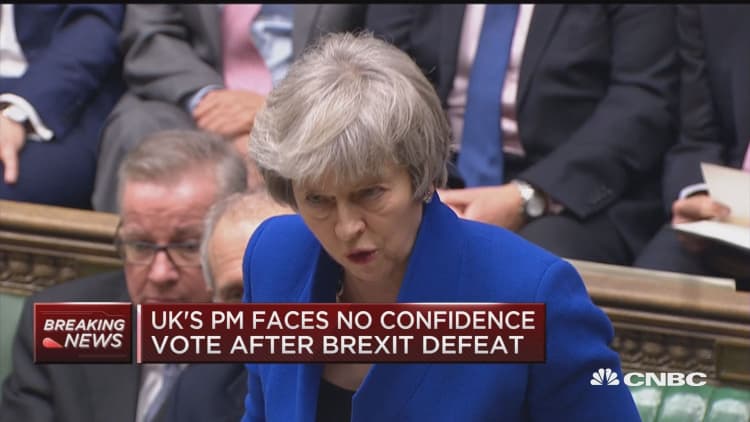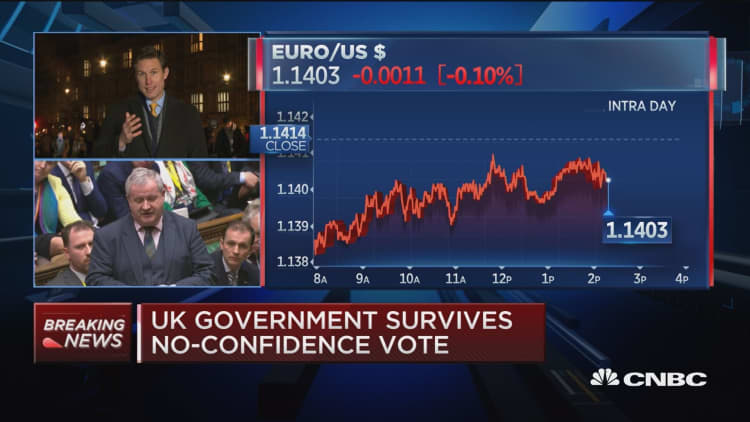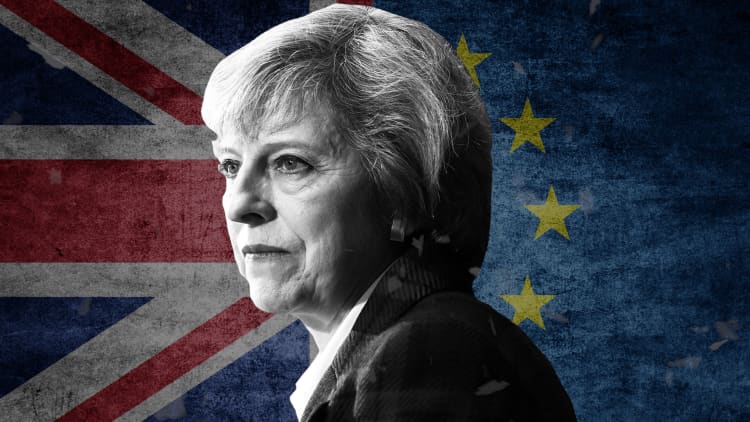
The U.K. government led by Prime Minister Theresa May has survived a vote of no confidence.
Lawmakers in the U.K.'s lower house of parliament, the House of Commons, voted to defeat the motion raised by the leader of the main opposition Labour party, Jeremy Corbyn, by 325 votes to 306.
Immediately after the vote, May said her government would continue to work to deliver on Brexit and said it was their duty to find a way forward that was approved by the House.
May was backed by members of the Northern Irish Democratic Unionist Party and the Brexiteer Conservative Party lawmakers who had voted against her EU withdrawal plan in the same chamber only 24 hours earlier. On Tuesday evening, lawmakers voted by 432 to 202 to reject May's Brexit deal.
Votes of no confidence in the government from Labour, Welsh and Scottish nationalists, the Liberal Democrats and the Green Party were not enough to dislodge the current government.

The motion, tabled following May's 230-vote defeat on Tuesday, is an official way to vote on the confidence in any current U.K. government.
If the motion was agreed to, the sitting government would've had 14 days to form a new government that can win a subsequent confidence motion in the House of Commons. If not, then a general election would have been called.
The pound rose slightly against the dollar after a result that was widely expected.
"While Corbyn may try his luck with another vote of no confidence in the government soon, we would not expect him to have any more success a second time around," Kallum Pickering, senior economist at Berenberg Bank, said in a research note.
"We reduce the risk of a Corbyn-led government from 30 percent to 20 percent. If parliament soon agrees to pursue a soft Brexit outcome, the risk that Corbyn could end up in Number 10 could fall even further."
What will May do now?
May's victory drastically reduces the likelihood that her government will face a general election in coming weeks, appearing to remove at least one strand of uncertainty from the Brexit confusion.
However, she still faces the task of cobbling together a deal that will satisfy both lawmakers in Europe and the U.K. as well as delivering on the 2016 referendum result.
In a speech at 10 Downing Street later Wednesday evening, May said it was time for members of parliament to come together and act in the national interest by finding a deal that can deliver Brexit.
Earlier in the day, Corbyn said May's government had no fresh ideas and was trying to press ahead with a plan that had already been soundly rejected. The left-wing leader of the opposition said May should enter talks with his party and the EU to arrange a new deal.
"Yesterday the house rejected her deal. She needs to come up with something different than that," he said.

May has said she will now discuss options with lawmakers from different parties, although she has pointedly not been in direct contact with Corbyn.
The Conservative prime minister hasn't rejected holding talks on extending the negotiating period beyond the U.K.'s current departure date of March 29, but noted that for Europe to agree to that, a fresh withdrawal plan would have to be agreed.
One other area that some have suggested could gather cross-party majority is for the U.K. to remain within the EU's Customs Union. This is an agreement that allows partaking countries to set common external tariffs, allowing goods to travel freely between those countries.
This also looks tricky as any move toward that would restrict the U.K.'s ability to strike fresh trade deals around the world — one of the major reasons why some pressed for Brexit in the first place.
European Commission President Jean-Claude Juncker has so far refused to budge from the withdrawal agreement agreed in November last year. He claimed in a statement Tuesday that Britain is now closer to a "disorderly withdrawal."


